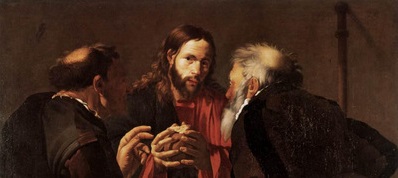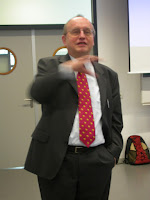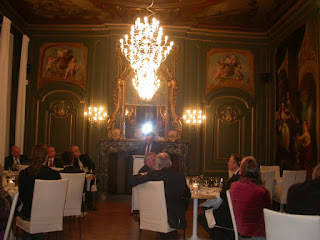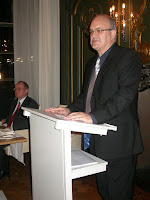Well, the ETS debate on Justification was so significant that its worth discussing. There are however not much known about how the debate went at this stage. Will be great to get some feedback! I did however manage to find some thoughts about what happened on thegospelcoalition blog:
A Justification Debate Long Overdue
"A record crowd of more than 2,500 turned out in Atlanta this week for the annual meeting of the Evangelical Theological Society, focused on “Justification By Faith.” The conference’s main event—three papers and debate over justification between New Testament scholars Frank Thielman, Tom Schreiner, and N. T. Wright—might be about three years too late to slow the spread of controversy over justification that has gripped evangelicals. Unfortunately, a planned face-to-face discussion between John Piper and Wright fell through when Piper took an extended sabbatical. But the novelty of pairing Wright on a panel with Schreiner, another key critic, still riveted an audience that enjoyed more than two hours of sustained debate over New Testament texts, Greek terminology, and ancient Near Eastern and Roman society.
Schreiner, James Buchanan Harrison professor of New Testament interpretation at the Southern Baptist Theological Seminary, opened the long-anticipated exchange by delivering a paper on Wednesday night called “Justification: The Saving Righteousness of God in Christ.” He engaged in a direct and sustained critique of Wright, even as he labored to show common ground with the man he described as a groundbreaking thinker. He acknowledged that Wright is fundamentally correct that first-century Jews incurred the judgment of exile in the form of Roman oppression due to their sin. When Wright responded to Schreiner on Friday morning, he expressed surprise over their agreement on this point.
Schreiner also agreed with Wright that evangelicals who hold to sola scriptura recognize no other authority, including tradition, as final. But Schreiner identified three false polarities that he said Wright perpetuates:
1.Wright argues that justification is primarily about ecclesiology instead of soteriology.
2.Wright says Israel’s fundamental problem was failing to bless the world. But Paul focuses on Israel’s inherent sinfulness.
3.Wright contends that justification is a declaration of God’s righteousness but does not include the imputation of God’s righteousness.
Supporting his first charge, Schreiner said justification is not identical to salvation, redemption, or sanctification. But the word appears in such contexts focusing on how we are saved, such as Romans 3:24 and Romans 4:6-8. Regarding his second point, Schreiner appealed to Romans 2 to show that the Jews’ sin was not primarily excluding Gentiles but rather failing to obey God and his law. Finally, Schreiner said it is strange that Wright maligns imputation when he admits God requires perfect obedience. Indeed, Paul would appear to teach imputation in such verses as 1 Corinthians 1:30 and 2 Corinthians 5:21. It is true, Schreiner agreed with Wright, that no human judge can give a guilty defendant his righteousness. But the law-court metaphor in Scripture should not be considered exhaustive. Indeed, its limitations at precisely this point should lead us to wonder in the gospel of God, who gave up his only Son for guilty sinners.
The second plenary address—delivered by Frank Thielman, Presbyterian professor of divinity at Beeson Divnity School—focused on Romans 1:16-17. Thielman offered a mediating position that suggested several intended meanings from Paul for the contested and consequential phrase “righteousness of God.” Original hearers, Thielman said, would have understand this phrase to refer to the saving activity and gift of acquittal from God on the basis of faith. They also would have understood that God is fair, even-handed, and equitable in the way he distributes salvation.
One Important Phrase, Several Intended Meanings
Thielman cited the first commentary on Romans, written by Origen, who spoke and wrote the same Greek language as Paul. Origen understood the apostle to teach that the “righteousness of God” means all, whether Jew or Gentile, may find salvation in the gospel. Thielman illustrated his point by citing several coins used in the Roman Empire. Nero, emperor during the end of Paul’s ministry, appeared on one coin with the word dikaiosune, which we translate in Scripture as “righteousness.” It would seem, Thielman said, that Nero seeks to portray himself not so much as just but equitable in how he distributes grain harvested in Egypt.
Is it really likely, though, that Paul would use one phrase and intend several meanings? Thielman said this practice was common in ancient writing. So Paul did in fact reveal in this famous passage that God counts believers acquitted, as Martin Luther realized. But the inspired apostle also taught that God is fair, and he powerfully rescues his people.
The Main Event
Probably the main attraction, though, was the Friday morning address by N. T. Wright, research professor of New Testament at St. Andrews University and the former bishop of Durham. For years now Wright has faced sustained criticism in the form of books, journal articles, and lectures from a number of the most prominent scholars in ETS. He jumped into the lion’s den in Atlanta with his paper, “Justification Yesterday, Today, and Forever.” From the beginning, Wright displayed his characteristic blend of humor, charm, and wide-ranging intellect with an unrelentingly rapid speaking pace. He has indeed read his critics, but he hardly backed down at ETS. In fact, he seemed more than a little perturbed by the wide range of arguments leveled against his writing on justification. He called for a new ethic of Christian blogging and faulted believers for pulling his statements out of context and reaching false conclusions about his work.
In his preliminary remarks, Wright dealt directly with several of the most controversial charges leveled against him and by his defenders. He reasserted his Protestant credentials and said we need to allow Scripture to say things our human traditions have not said. And he denied that any single person holding to the New Perspective on Paul has joined the Roman Catholic Church. In fact, he said critics who charge him with biblicism have no sense of irony and history; they are the real neo-Catholics. Wright made the case that the Reformers and his modern-day critics ask contemporary questions of Pauline texts, not the ones Paul actually addressed for the benefit of Jews and Gentiles gathered together in one church. Thus, Wright’s critics are the real modern-day demythologizers who abstract bits and pieces of Paul’s thought by tearing them from the original context.
One Big Story
True to form, Wright kept the big story in view as he analyzed specific passages. God’s plan to bless the world through humans was thwarted by the fall. Then he planned to rescue humankind through Abraham and his descendants. But they, too, failed. So God sent his Son, the Messiah of Israel, to announce that God’s kingdom had come with his life, death, and resurrection. Adam’s sin is the problem, Wright said, and God’s covenant with Abraham is the solution.
Known for weaving compelling biblical narratives, Wright rejected any claims that he distorts the meaning of passages by reshaping them to fit his big story. He willingly treated many of the most important verse from Romans, Ephesians, Galatians, and elsewhere. He complained that he continues to vainly search for serious treatments from his critics of Romans 4 as Paul’s exposition of the Abrahamic covenant. “Only by close attention to Scriptural context can Scriptural doctrine be Scripturally understood,” Wright said. Each element must be treated in light of the whole. But we derive our view of the whole by carefully interpreting each element.

Wright made numerous references to his critics and their works. But he referred to few by name. He disputed Simon Gathercole on Romans 4:4-8, which he said borrows the idea of reward from God’s promise to Abraham in Genesis 15:1. He faulted the two-volume set Justification and Variegated Nomism—edited by D. A. Carson, Mark Seifrid, and Peter O’Brien—for not considering a crucial passage from the intertestamental Qumran literature that he says sheds light on Paul’s teaching.
During his paper, Wright did not, however, mention John Piper, originally scheduled to engage with him at ETS. But Wright clearly had him in mind. Piper has criticized Wright for undermining Christian assurance with his view on justification. In particular, Piper cites Wright teaching that final judgment will be on the basis of works. Indeed, Wright wrote in Paul: In Fresh Perspective:
The whole point about “justification by faith” is that it is something which happens in the present time (Romans 3:26) as a proper anticipation of the eventual judgment which will be announced, on the basis of the whole life led, in the future (Romans 2:1-16).
But Wright contends he does not mean what Piper and others believe he does. If doubts linger, however, Wright said that he believes final judgment will be in accordance with works—something Piper and Schreiner acknowledge from Romans 2:6—and not on the basis of works. Justification involves spiritual struggle, Wright said, and Christians should beware of antinomianism that neglects this teaching.
Wright appeared especially troubled by the charge that he wouldn’t know what to say to someone dying who asked, “What must I do to be saved?” Wright said, “The gospel is the royal announcement that the crucified and risen Jesus is Israel’s Messiah and Lord of the world. That’s good news.” He would encourage someone dying to find eternal life by confessing the name of Jesus, the crucified and risen One, in whom we find healing, forgiveness, reconciliation, peace, and hope.
Irreconcilable Differences
During more than two hours of discussion that followed these papers, a number of differences remained irreconcilable. Schreiner said justification has ecclesiological implications, but contrary to Wright, he believes it is chiefly about the forgiveness of sins. Wright remains uncomfortable with describing righteousness as a gift, as if it can get passed around. Schreiner cautions against pushing the law-court metaphor hard, but Wright says Paul does just that in Romans 3. And Wright continues to believe that Schreiner and others fail to understand the significance of Paul’s argument in Romans 9-11 that God’s plan to save the world through Israel has not failed.
It’s too early to tell whether this week’s ETS meeting will fundamentally change the debate over justification. Wright ceded little if any ground to his critics. But he offered clarification for at least one of their chief concerns. He continued to disparage the Reformers, particularly Luther, for asking the wrong questions and missing Paul’s point. But Schreiner agreed with Wright that Protestants should privilege no tradition above God’s Word. Schreiner expressed sincere appreciation for Wright’s work. And Wright gave evidence simply by showing up in Atlanta that he takes his critics seriously. For that he and ETS and should be commended. This face-to-face debate was long overdue."
I hope to place Simon Gathercole's response (review) of Wright's latest work on Justification next week.








































